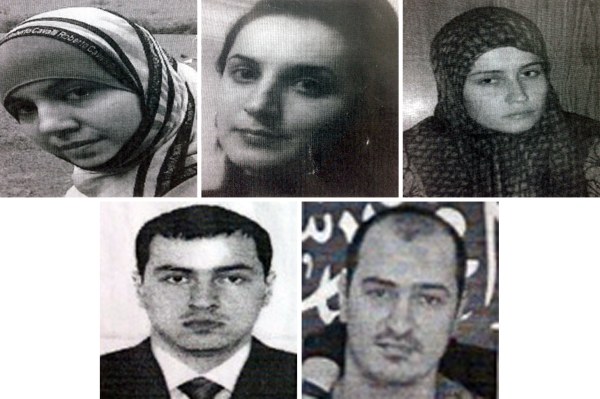Sochi Olympics Terrorism Threat- Tuspects Identified

Russian security officials are hunting for two more young
Muslim women — so-called “black widow” terror suspects — who they believe are
planning to target the final stages of the Olympic torch relay with suicide
bomb attacks.
Wanted posters distributed by police say that the women have
been dispatched by underground groups to attack between Tuesday and Thursday in
Rostov-on-Don, where the torch is expected to arrive Wednesday on its way to
the Olympic city of Sochi.
The posters warn that the suspected terrorists may wear
clothes that do not adhere to Islamic tradition, such as long dresses and
hijabs, so that they can blend and “infiltrate into places with mass gatherings
without hindrances.”
The posters ask for help finding the women: Jhannet
Tsakhaeva, 34, from the restive Russian
region of Dagestan, and Oksana Aslanova, 26, from Turkmenistan. A third woman
who was wanted, Zaira Alieva, 26, from Dagestan, was killed Saturday by Russian
security forces in Dagestan.
In addition, wanted posters seen by NBC News on Tuesday
identify two men — Ruslan Saufutdinov, 21, and Murad Musaev, 25 — who the
posters say are planning attacks in southern Russia.
Wanted posters are being distributed to Russian police
stations alerting them about young Muslim women suspected to be militants
targeting the upcoming Winter Olympics.
The posters suggest “gaping holes in security right now in
Sochi,” said Evan Kohlmann.
They said that they undercut Russia’s plan for a “ring of
steel” around Sochi to protect the games — a 1,500-square-mile security zone
that includes more than 40,000 police officers, special forces, ultra-sensitive
sonar, monitoring drones and patrol boats.
“The problem is that when you need to stop a lone-wolf
suicide bomber, you need to think about government intelligence. You need to
think about preventive measures,” said Andrei Soldatov, a Russian security
expert. “But not about the number of troops you can put on the ground.”
Rostov-on-Don is about 350 miles north of Sochi. The stop in
Rostov-on-Don will be the 120th for the Olympic torch, leaving 16 before it
reaches its destination for the Feb. 7 opening ceremony of the Winter Games.
To the east of Sochi is the volatile Caucasus region, where
an Islamic insurgency is simmering. It is the area of greatest concern as
President Vladimir Putin tries to protect his Olympics from terrorism.
Russia has been aggressive in trying to decapitate the leadership
of militant groups in the Caucasus. But there are “plenty of foot soldiers and
volunteers” willing to join the fight, said Andrew Weiss, a former Russia
expert in the Clinton White House who is now vice president for studies in the
Russia and Eurasia Program of the Carnegie Endowment for International Peace.
“The added part of this is the regional, small-cell-based
structure,” said Weiss, who is an NBC News analyst. “It’s very hard for the
Russian security forces to penetrate that. That’s been a chronic problem for
the Russians all along.”
Terrorism analyst for NBC News Evan Kohlmann says the stakes
are high in the search for the suspected "Black Widow" Russian
terrorists, who may have slipped through security to reach the country, because
of their ability to change their appearances.
Fears of an attack are growing as the games approach. On
Sunday, a video surfaced in which two men claimed responsibility for twin
bombings last month in the Russian city of Volgograd, and vowed they had a
“surprise” in store for Putin and Olympic tourists.
Another poster named Ruzana Ibragimova, also known as
Salima, as a suspected terrorist intent on targeting the Sochi Olympics. “Black
widow” terror suspects are so named because some are seeking to avenge the
deaths of their husbands.
Ibragimova was made a widow last year, when Russian forces
killed her husband, also a suspected militant. She has a 4-inch scar on her
left cheek that reportedly came from Russian troops.
The Pentagon said Monday that the United States has offered
its support to the Russian government and that American air and naval assets,
including two ships in the Black Sea, will be available if the Russian
government asks for help.
Senior U.S. military officials, however, said on Monday that the likelihood that Putin would ask for help was zero.
No comments:
Post a Comment